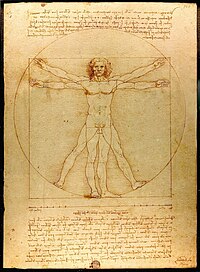| Part of a series on |
| Humanism |
|---|
 |
| Philosophy portal |
| Rights |
|---|
 |
| Theoretical distinctions |
| Human rights |
| Rights by beneficiary |
| Other groups of rights |
|
The quotation "all men are created equal" is found in the United States Declaration of Independence. The final form of the sentence was stylized by Benjamin Franklin, and penned by Thomas Jefferson during the beginning of the Revolutionary War in 1776.[1] It reads:
"We hold these truths to be self-evident, that all men are created equal, that they are endowed by their Creator with certain unalienable Rights, that among these are Life, Liberty and the pursuit of Happiness."
The phrase echoes the words of John Locke in his second treatise on government, and other authors as early as the 13th century. Jefferson applied the concept in his original draft of the declaration.[2][3] It was thereafter quoted and incorporated into speeches by a wide array of substantial figures in American political and social life in the United States. It has been called an "immortal declaration", and "perhaps [the] single phrase" of the American Revolutionary period with the greatest "continuing importance."[4][5]
- ^ Peterson, Merrill. Thomas Jefferson and the New Nation: A biography. p. 90. Oxford University Press, 1970.
- ^ "Jefferson's "original Rough draught" of the Declaration of Independence". jeffersonpapers.princeton.edu.
- ^ Jefferson, Thomas (2018), The Papers of Thomas Jefferson, Volume 1: 1760 to 1776, Princeton University Press, p. 315, ISBN 978-0-691-18466-1
- ^ See, e.g., Jack P. Greene, All Men Are Created Equal: Some Reflections on the Character of the American Revolution (1000. p. 5: "Perhaps no single phrase from the Revolutionary era has had such continuing importance in American public life as the dictum 'all men are created equal'".
- ^ John Wynne Jeudwine, Pious Phrases in Politics: An Examination of Some Popular Catchwords, their Misuse and Meanings (1919), p. 27, quoting Senator Lyman Trumbull of Illinois, author of the Thirteenth Amendment to the United States Constitution, as referencing the "immortal declaration that all men are created equal".